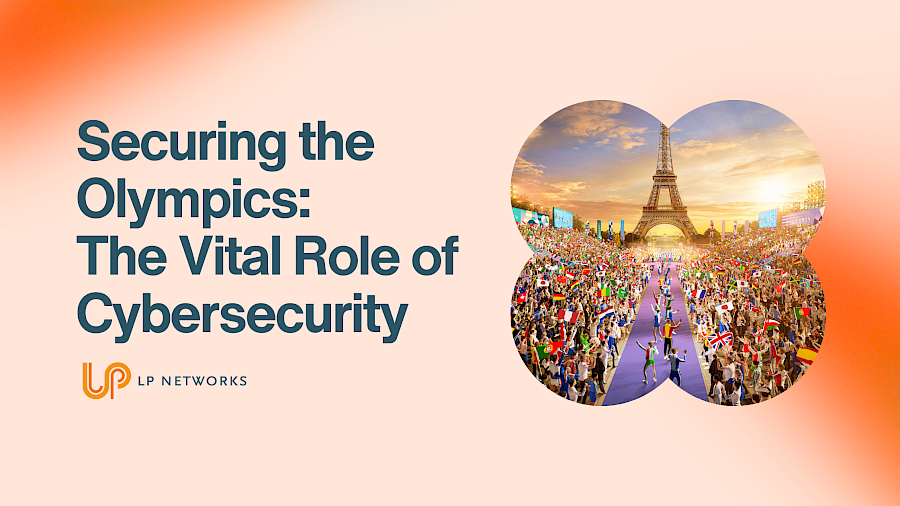- Solutions For
Specialist IT Support Services for:
- Popular Services
- Security
Security
- Our Expertise
Our Full Range of IT Services
- Learn
- About Us
- Contact
Posted 15th July 2024

It’s nearly time for one of the worlds most anticipated and exciting sporting events - The Olympics! It brings together athletes, media and fans from all over the world, yet with the excitement building it’s also important to plan any cybersecurity measures. At LP Networks, we understand the critical importance of safeguarding digital assets during such high-profile events. The Olympics are a prime target for cyberattacks, and ensuring your business is safe and has plans in place with cybersecurity is paramount.
As the Olympics is such a large and visible event it makes it an attractive target for cybercriminals. From ticketing systems, data of fans, athletes and businesses to infrastructure the potential attack surfaces are vast. Here are some key reasons why the Olympics are particularly vulnerable to cyber threats:
1.Massive Data Traffic:
The Olympics can generate a huge amount of data, which can include everything from personal information of athletes, staff and fans as well as data such as financial transactions, broadcast content and business data.
2.Global Audience:
With so many viewers worldwide, a successful cyberattack could impact millions of people which could have devastating effects beyond the event.
3.Diverse Stakeholders:
As the event involves numerous stakeholders including sponsors, media partners and vendors each with their own networks and systems it’s unfortunately a rich playground for cybercriminals to try and gain information.
4.High-Profile Targets:
As the Olympics has high visibility and popularity it can make it a high-profile target for cybercriminals trying to seek notoriety or huge financial gain.
Cyber threats can take many forms, and the Olympics are particularly susceptible to several types of attacks:
1. Phishing Attacks:
Cybercriminals will often use phishing tactics to steal sensitive information from unsuspecting individuals. During the Olympics, fake ticketing websites, fraudulent streaming links, and counterfeit merchandise are commonly used to steal this sensitive information.
2. Ransomware:
Hackers could target host cities such as Paris and organisations linked to the Olympics with ransomware attacks, these are where hackers encrypt data and then demand payment for it to be released. These attacks are used to disrupt operations, gain money and to compromise sensitive information.
3. Distributed Denial of Service (DDoS) Attacks:
Distributed denial of service (DDoS) attacks are becoming even more popular as they can overwhelm servers which causes websites and online services to crash. The attacks can cause disruptions to ticket sales, live streaming, access for fans into stadiums and delay other essential services.
4. Data Breaches:
So much of our personal data is now collected and stored online which can be a haven for cybercriminals. Criminals will target databases containing this sensitive information to gain our data to either sell or use it with negative consequences. As we give our data to companies and organisations surrounding the Olympics, it can mean our data is more likely to be targeted, as cybercriminals will target such a large event.
As the Olympics is such a huge and popular event, it can mean it’s crucial to have robust cybersecurity measures in place such as:
1. Protecting Sensitive Data:
It’s crucial to protect personal information and for the Olympics this could be data of athletes, staff, and spectators. Safeguarding will help prevent identity theft, financial fraud, and other malicious activities.
2. Maintaining Operational Integrity:
Cyberattacks can disrupt operations such as the smooth functioning of events such as the Olympics, from ticketing systems to live broadcasts.
3. Preserving Reputation:
A successful cyberattack could tarnish the reputation of the Olympics, businesses linked to it and its stakeholders, which could lead to loss of trust and credibility.
4. Ensuring Regulatory Compliance:
Compliance with data protection regulations, such as GDPR, is essential to avoid legal repercussions and fines.
To minimise the risks of cyberattacks during the Olympics, organisations should include comprehensive cybersecurity measures. Here are some best practices:
1. Implement Multi-Factor Authentication (MFA):
MFA adds an extra layer of security by requiring users to provide two or more verification factors to access sensitive information.
2. Conduct Regular Security Audits:
Regular security audits could help identify any IT vulnerabilities and ensure more robust security measures are in place. These audits should include penetration testing, vulnerability assessments, and reviewing data protection policies and procedures.
3. Educate Employees:
Regular training and awareness programs for employees, volunteers, and other stakeholders should be essential. They should be educated about common cyber threats, such as phishing and social engineering, and trained to recognise and report suspicious activities.
4. Develop an Incident Response Plan:
An effective incident response plan ensures that businesses can quickly and efficiently respond to cyberattacks. Your plan should outline the steps that should be taken in the event of a breach, and should include communication protocols, containment measures, and recovery procedures.
5. Monitor Network Traffic:
Use continuous monitoring of network traffic to help detect anomalies and potential cyber threats in real-time. Advanced threat detection tools and security information and event management (SIEM) systems can be used to identify and respond to suspicious activities promptly.
6. Secure Remote Access:
Since working remotely or hybrid working has become more popular, employees need to make sure their remote access is secure.
Make sure to implement virtual private networks (VPNs), ensure secure configurations and regularly update remote access policies which can help protect against remote access vulnerabilities.
The Olympics is always a highly anticipated sports event and so represents a huge challenge in terms of cybersecurity. The potential impact for a cyberattack increases with the popularity of the event and so it’s important to make sure you’re ready with robust security plans beforehand. At LP Networks, we recognise the critical importance of cybersecurity measure to protect the safety of personal data and the smooth operations of businesses. As we look forward to the upcoming Olympics, let's ensure that cybersecurity is a top priority, safeguarding this global celebration of sporting excellence from the potential threat of cybercrime.

